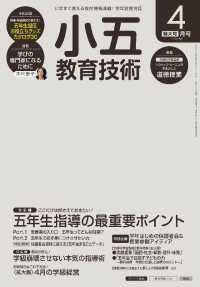- ホーム
- > 洋書
- > 英文書
- > History / World
Full Description
The first study to document how the Civil War brought about a bitter cultural and political conflict between Great Britain and the United States, a conflict that ignited a global struggle for racial equality and human rights.
This study tells for the first time the story of a bitter cultural and political conflict that arose between the leading writers and intellectuals of Great Britain and the United States during the Civil War. The latter were virtually all New Englanders. Ralph Waldo Emerson was a central figure. The British side included such notables as Thomas Carlyle, Matthew Arnold, and John Ruskin. The conflict was focused on the viability of liberal democracy and the notion that "all men are created equal." The question was: What type of social, political, and cultural paradigm was best suited to ensure the advancement of civilization--one in which all have equal rights, regardless of race or class, or one where a small number of privileged white elites exercise a controlling power? The New Englanders embraced the former and the British the latter. The result was a bitter alienation that ignited a global campaign for racial equality and universal human rights.
Contents
Acknowledgments
Abbreviations
Introduction
1. 1860: Slavery, Race, and the Seeds of Cultural Conflict
2. 1861: As Civil War Approaches, the Debate over Slavery Intensifies at Home and Abroad
3. War Against Slavery at Home Brings Conflict Abroad
4. The North Suffers a Humiliating Defeat: British Critics Gloat
5. The Old World and the New Collide: The Trent Affair Brings the Threat of War
6. 1862: Talk of Emancipation Fuels British Fears of a Global Race War
7. Union Victories Temper British Critics
8. The North Suffers Military Reversals: British Consider Intervention
9. Lincoln Proclaims Emancipation as Race Takes Center Stage
10. Midterm Elections Focus on Race
11. 1863: As the Civil War Becomes a Second Revolution, Conflict with Great Britain Looms
12. British Conservatives React with Alarm as Race and Class Become Central Issues
13. New England Liberals Herald the Rise of the "African American": British Critics Scoff
14. Union Victories and Colored Soldiers Change the Course and Complexion of the War
15. Lincoln Affirms Commitment to Emancipation: Animosity Toward Great Britain Deepens
16. Lincoln Speaks for Equality: The Anglo-American Divide Widens
17. 1864: The "Negro Question" Spurs Intense International Debate
18. Republican Radicals Declare Slavery Must Go: British Call for "Regulated Coercion"
19. Atlanta Falls and Lincoln Rises: British Criticism Intensifies
20. 1865: The Civil War Ends, but the Battle for Human Rights Continues
Epilogue
Notes
Bibliography
Index








